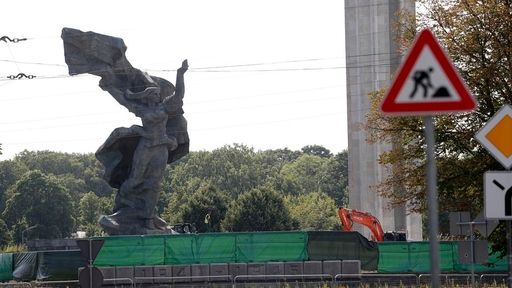On the mandatory language test in Latvia – Walter Mayr in Der Spiegel:
‘Our meeting spot is a café on the edge of the Old Town of Riga, Latvia’s capital. Katya arrives punctually, takes a look at the crowded tables and spins on her heels: "Too many listeners." She finds what she’s looking for a couple of streets further along: an empty café.
The mistrustful Katya, an IT expert whose name has been changed for this story, is part of the Russian-speaking minority in Latvia. Since the beginning of the Russian invasion of Ukraine, many of them have been filled with fear. They feel like their fellow citizens suspect them of harboring pro-Kremlin sympathies and of being Trojan horses for Russian President Vladimir Putin.’
(…)
‘Russian speakers make up 30 percent of the Latvian population, for a total significantly in excess of half a million people. Around 50,000 of them have Russian citizenship. Most are descendants of the Russians, Ukrainians and Belarusians that Soviet dictator Josef Stalin resettled in Latvia from other parts of the U.S.S.R. At the same time, Stalin had tens of thousands of residents of the Baltic republic taken away and locked into Siberian camps. Following the collapse of the Soviet Union, Latvia declared 700,000 residents to be "non-citizens" with no right to vote. The reason: The non-citizens or their ancestors were not "real" Latvians. From that point on, they were stateless.’
(…)
‘The government in Riga is doing its best to eliminate everything from the public eye that is even remotely reminiscent of Russia. In August 2022, the Soviet victory memorial – commemorating victory over Nazi Germany in the "Great Patriotic War" – was torn down, an affront to the many who had gathered there every year on May 9 to remember their fallen ancestors. "Your time has run out," the Latvian defense minister said in a message to Russian speakers in the country.’
(…)
‘Half of Russian passport holders in Latvia have by now received a letter from the state. Those interested in extending their residency permits must take a test proving their basic facility with the Latvian language and must declare their loyalty to the fundamental values of Latvia, a European Union member state. That includes answering questions like: "Do you condemn the Russian invasion of Ukraine?" Of those who have recently taken the language test, more than 60 percent failed in their first attempt.’
(…)
‘The majority of those affected are elderly people who only became Russian citizens in the last two decades because it gave them access to an additional pension from Russia – heavily touted by the Kremlin – at the relatively young age of 55. Others opted for Russia because they finally wanted to hold citizenship somewhere. But most of these people have never actually lived in Russia.’
(…)
‘Three hours by train from Riga, in the southeastern corner of Latvia, lies Daugavpils, the country’s second largest city. Here, not far from the borders to Lithuania and Belarus, in one of the poorest regions in Europe, close to 80 percent of the population speaks Russian.
In 2016, the BBC threw the spotlight on Daugavpils in the form of its fictional documentary "World War Three – Inside the War Room." In the film, Russian-speaking insurgents pull the EU flag down from its mast, chant "Rossiya" and prompt Western military strategists to consider how they might react to a Russian nuclear strike.
The speculative BBC film about a possible third world war was opportune for elements of the Russian state media. TV Zvezda, the propaganda broadcaster of the Russian Defense Ministry, exulted that it presented the image of a NATO that wasn’t necessarily in a position to defend itself. Residents of Daugavpils, though, weren’t quite as pleased about the headlines.’
(…)
‘The language test, says Olga Petkeviča, is the greatest source of stress for many. "Some people come in who have failed the test four times already," she says. She works out of a tiny room in the city hall, barricaded behind boxes full of forms. She says that a black market has long since developed for certificates declaring the holder to be unfit for learning a foreign language.’
(…)
‘On a Wednesday shortly before 1 p.m., the elderly begin gathering outside Petkeviča’s office. Dressed in Soviet-style clothing – most of the women wearing knitted beanies and the men in slider caps with earflaps – they stand in a long line in the hopes of getting a bit of advice. They are holding papers in plastic folders – letters in Latvian officialese that have made them uneasy.
"Please leave Latvia by April 1," reads the letter that Lyubov, a 63-year-old woman, digs out with shaking hands. She missed the mandatory deadline and did not take a language test out of fear of failure. Nothing more can be done for her through official channels. Petkeviča tries to comfort her and promises to draw up a petition for clemency.’
Read the article here.
Not so much has changed since the US detained Japanese-American citizens during world War II.
The so-called European values are not valid for the Russians in Latvia, but it’ already noticed before: in the periphery European values go up in smoke quickly.
‘Nothing more can be done for her through official channels.’ That’s the language of the state busy crushing citizens and non-citizens, in tne name of security or another lofty ideal.
